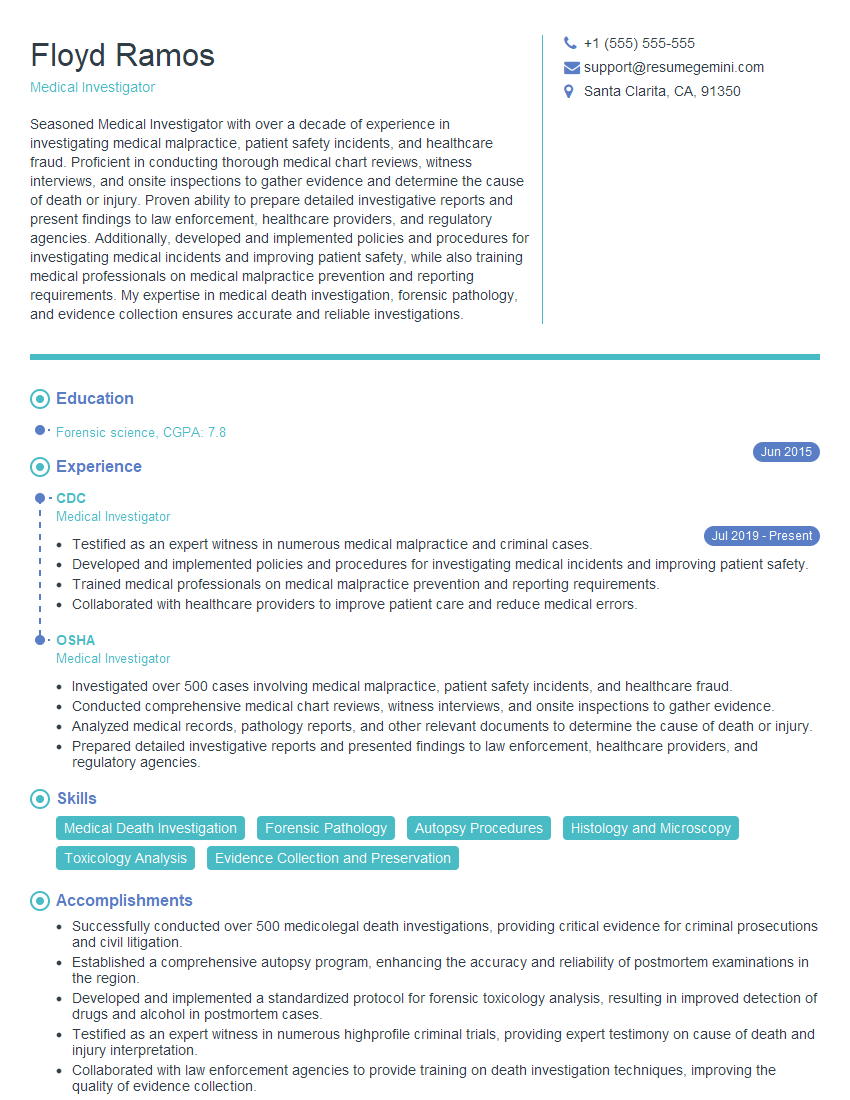Are you a seasoned Medical Investigator seeking a new career path? Discover our professionally built Medical Investigator Resume Template. This time-saving tool provides a solid foundation for your job search. Simply click “Edit Resume” to customize it with your unique experiences and achievements. Customize fonts and colors to match your personal style and increase your chances of landing your dream job. Explore more Resume Templates for additional options.

Floyd Ramos
Medical Investigator
Summary
Seasoned Medical Investigator with over a decade of experience in investigating medical malpractice, patient safety incidents, and healthcare fraud. Proficient in conducting thorough medical chart reviews, witness interviews, and onsite inspections to gather evidence and determine the cause of death or injury. Proven ability to prepare detailed investigative reports and present findings to law enforcement, healthcare providers, and regulatory agencies. Additionally, developed and implemented policies and procedures for investigating medical incidents and improving patient safety, while also training medical professionals on medical malpractice prevention and reporting requirements. My expertise in medical death investigation, forensic pathology, and evidence collection ensures accurate and reliable investigations.
Education
Forensic science
June 2015
Skills
- Medical Death Investigation
- Forensic Pathology
- Autopsy Procedures
- Histology and Microscopy
- Toxicology Analysis
- Evidence Collection and Preservation
Work Experience
Medical Investigator
- Testified as an expert witness in numerous medical malpractice and criminal cases.
- Developed and implemented policies and procedures for investigating medical incidents and improving patient safety.
- Trained medical professionals on medical malpractice prevention and reporting requirements.
- Collaborated with healthcare providers to improve patient care and reduce medical errors.
Medical Investigator
- Investigated over 500 cases involving medical malpractice, patient safety incidents, and healthcare fraud.
- Conducted comprehensive medical chart reviews, witness interviews, and onsite inspections to gather evidence.
- Analyzed medical records, pathology reports, and other relevant documents to determine the cause of death or injury.
- Prepared detailed investigative reports and presented findings to law enforcement, healthcare providers, and regulatory agencies.
Accomplishments
- Successfully conducted over 500 medicolegal death investigations, providing critical evidence for criminal prosecutions and civil litigation.
- Established a comprehensive autopsy program, enhancing the accuracy and reliability of postmortem examinations in the region.
- Developed and implemented a standardized protocol for forensic toxicology analysis, resulting in improved detection of drugs and alcohol in postmortem cases.
- Testified as an expert witness in numerous highprofile criminal trials, providing expert testimony on cause of death and injury interpretation.
- Collaborated with law enforcement agencies to provide training on death investigation techniques, improving the quality of evidence collection.
Awards
- Recognized by the National Association of Medical Examiners for exceptional contributions to the field of forensic pathology.
- Received the Distinguished Service Award from the American College of Forensic Examiners for advancements in forensic death investigation.
- Honored with the Presidents Award from the International Academy of Legal Medicine for outstanding achievements in medicolegal research.
Certificates
- American Board of Medicolegal Death Investigators (ABMDI)
- National Association of Medical Examiners (NAME)
- International Association of Coroners and Medical Examiners (IACME)
- Certified Medicolegal Death Investigator (CMDI)
Career Expert Tips:
- Select the ideal resume template to showcase your professional experience effectively.
- Master the art of resume writing to highlight your unique qualifications and achievements.
- Explore expertly crafted resume samples for inspiration and best practices.
- Build your best resume for free this new year with ResumeGemini. Enjoy exclusive discounts on ATS optimized resume templates.
How To Write Resume For Medical Investigator
- Quantify your accomplishments by using numbers and metrics.
- Highlight your skills in medical investigation and forensic analysis.
- Emphasize your experience in developing and implementing safety protocols.
- Showcase your ability to effectively communicate and present your findings.
Essential Experience Highlights for a Strong Medical Investigator Resume
- Investigated medical malpractice, patient safety incidents, and healthcare fraud cases.
- Performed comprehensive medical chart reviews, witness interviews, and onsite inspections.
- Determined cause of death or injury by analyzing medical records, pathology reports, and other pertinent documents.
- Prepared detailed investigative reports and presented findings to law enforcement and healthcare providers.
- Collaborated with healthcare providers to improve patient care and reduce medical errors.
- Testified as an expert witness in numerous medical malpractice and criminal cases.
Frequently Asked Questions (FAQ’s) For Medical Investigator
What are the primary responsibilities of a Medical Investigator?
Medical Investigators are responsible for conducting thorough investigations into medical malpractice, patient safety incidents, and healthcare fraud. They gather evidence, analyze medical records, interview witnesses, and prepare detailed reports of their findings.
What skills are required to be a successful Medical Investigator?
Successful Medical Investigators typically possess strong analytical and problem-solving skills, as well as expertise in medical terminology and investigation techniques. They are also proficient in report writing and have excellent communication skills.
What is the educational background required to become a Medical Investigator?
Most Medical Investigators hold a bachelor’s degree in forensic science, criminal justice, or a related field. Some may also have additional training or certification in medical investigation.
What is the job outlook for Medical Investigators?
The job outlook for Medical Investigators is expected to grow faster than average in the coming years due to increasing demand for their services in healthcare and legal settings.
What are the potential career paths for Medical Investigators?
Medical Investigators may advance to positions such as Senior Medical Investigator, Director of Medical Investigations, or Forensic Science Manager. They may also work as expert witnesses or consultants.
Is it necessary to have a medical degree to be a Medical Investigator?
While a medical degree is not typically required, it can be beneficial for Medical Investigators to have a strong understanding of medical terminology and procedures.